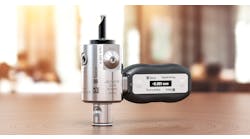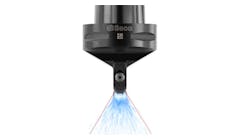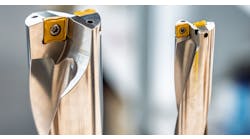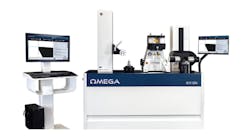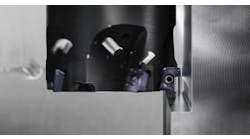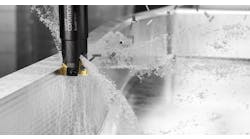Without a fully optimized manufacturing process, individual machines as well as entire plants will fall short of their full potential for productivity and cost-effectiveness. To avoid this, shops should take advantage of engineering and process-optimization support services offered by truly capable manufacturing equipment suppliers. Such services may encompass just a few lines of code for a cutting program or a comprehensive, turnkey solution for developing and maintaining an entire production line.
This represents a significant forward development in the understanding of manufacturing processes. For many shops, “process improvement” begins and ends with the purchase of a new machine or component. The approach is simple, but expensive, and frequently results in just replacing a suboptimal process with a newer, suboptimal process. The sophisticated technology in the latest machines, fixturing and tools requires equally sophisticated process management.
Those shops that make continuous improvement a core element of their strategies should seek out a process optimization partner. Whether beginning work on a new line of parts or making large capital investments in the form of state-of-the-art machines, process optimization experts like the Seco Engineered Solutions team, can make recommendations on tools, CAM software, or even entire machine lines, so that the shop may realize the greatest potential return on its investment.
As an industry leader in all things metalcutting, Seco Tools has developed wide-ranging expertise it uses on behalf of its customers via its Engineered Solutions and Custom Products divisions. Between these two teams, Seco can provide anything from a quote on tooling options to a complete production solution. In a free initial consultation, the Seco Engineered Solutions team evaluates the scope of the project, discusses customers’ requirements and establishes a provisional timeline. While this stage is particularly useful for customers who need comprehensive process management services, companies with their own engineering staff can also benefit from a consultation with Seco Engineered Solutions, which can provide advice and quotes on standard or custom tooling packages to improve existing processes. Those who want the greatest benefit, however, should bring in the team at Seco during the inception of a new metalcutting application.
To obtain the best results, shops must begin with the part, and reconsider what may be the most optimized way to produce it. For instance, one might cut a pocket with dynamic milling, high-feed milling or plunge milling. Many shops would simply choose the cheapest available machine or an easily implemented process, but a process optimization specialist would point out that a high-precision, high-speed mill used to plunge will cut pockets poorly, while a long-edge tool that performs dynamic cutting would work best. Armed with this information, process optimization experts can build an entire workflow around the part’s production, from the machine to the individual tools and cutting data.
Comprehensive process optimization begins with an evaluation phase that identifies the combination of tooling, fixturing, machines and cycle times that will result in the most cost-effective and efficient process. Seco Engineered Solutions collects this information in a proposal that covers everything from the necessary equipment to the cutting data, as well as any required custom tools. The Custom Products department fabricates and assembles any products required by the process at Seco’s Troy, Mich., production facility. Then, the team assembles, balances, and certifies the quality with a final inspection document prior to shipping so that everything arrives ready to run off on a customer’s machine.
Naturally, Seco supports its engineered process solutions with its global network of engineers, CAM experts, and other customer service specialists, so it can implement the provided solution and offer assistance throughout a project’s lifetime. As a result, the average customer sees an overall improvement in productivity of 25 percent or more when the solution is implemented. Best of all, the entire service is backed by a price guarantee that ensures that customers only pay for successfully implemented processes.
Of course, beginning the optimization process prior to even purchasing a machine can be impractical. In these instances, a specialist likely will gather all of the available information about the current manufacturing process. This includes the part, its material, and the number of operations to be performed, as well as the specifications of the fixtures, workholding devices, coolant, machine control paradigm, and the machine or machines to be used.
Next, the workflow optimization process begins with a simple question: “What is the most efficient result that can be obtained with these inputs?” For experts like Seco’s Engineered Solutions team, this usually involves a look through the archives. Few projects today involve any real unknowns for a sufficiently experienced group of engineers, after all, none of whom want to waste time on expensive wheel-reinvention efforts. Instead, the experts apply their own know-how to the customer-supplied data to evaluate cost-per-unit, projected cycle times, machine capacity and other factors to create a documented process with recommended cutting data.
This approach to process optimization is not new but it has become much harder to accomplish in-house for all but the largest companies. For everyone else, retaining the engineering and operational talent necessary to craft optimal processes is more difficult than ever. Few manufacturing suppliers offer turnkey process solutions with their machines, and most shop managers are uninterested in process optimization when they have worn-out machinery to replace.
Because of this, shops have more reasons than ever before to seek out a manufacturing supplier with process optimization expertise, especially those that work in the most competitive industries. Automotive manufacturers, for example, frequently improve their processes on a continual basis. An automotive OEM might redesign its vehicle wheel styles twice a year, and in those instances machine tool optimization would ensure that they find a reliable set of standard tooling that allow a shop to execute those changes without buying a new tool for every new wheel rim design.
At the other end of the spectrum, an aerospace company may produce fewer components per year, but each one will see daily use for many decades. Dedicated process managers can oversee changes to tooling, technology, and processes over the service life of these components, so they can solve any hiccup in production with the utmost expediency.
Today, manufacturers must have the “process mentality." It is no longer sufficient to simply buy the best machines or hire the best operators – to stay competitive, manufacturers have to design and implement optimal processes. With the help of an optimization service, these organizations can close the loop from programs to machines, to tooling, and arrive at a process that obtains the best possible results.
Bob Goulding is Technical Engineering Manager and Tom Funke is Component Engineered Tooling Manager, and both are with Seco Tools LLC — a provider of metalcutting technologies for milling, turning, holemaking, and toolholding. To learn more about Seco Engineered Solutions or to find out how to schedule a free consultation, visit secotools.com/custom.

